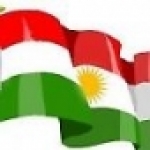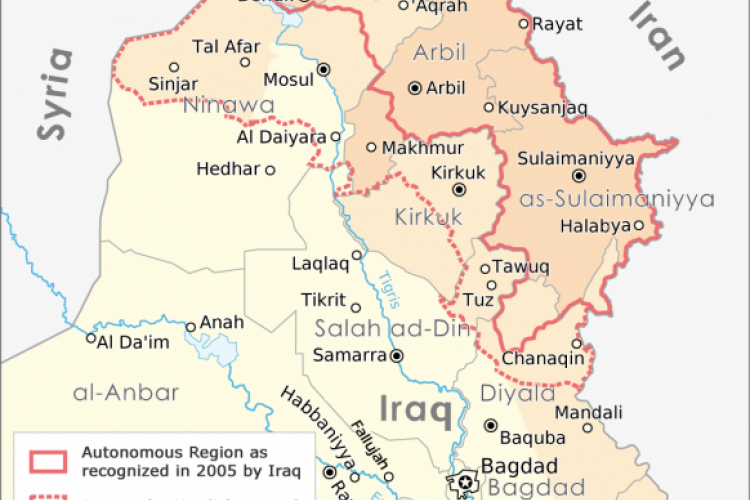Hatirlayan hatirlar, HeK demisti taaaa vakti zamaninda DNO'ya yatirim yapin, kazanirsiniz diye. Iste DNO Kurd petrolunden ilk odemesini aldi. Tarihi bir odemedir diye dusunuyorum, her ne kadar kazancimizin %100'u degilse de.
HeKce yazalim:
Atalarimizin binlerce yil once yerlestigi,
tum tarih boyunca hic ayrilmadigi Kurdistan.
Her hak - hukuka gore bizim olan topraklardaki zenginlik.
Ve yuregimize, beynimize saplanan kursun olarak degil de
cebimize para olarak girdigi..
Tersine cevrilmesi artik mumkun olmayacak bir cark.
Viva Kurdistan!
TAWKE - Three years ago, the only thing shining in this Kurdish village was the reflection off the seepage pools of crude bubbling in residents' backyards. Now the summer sun glares off the tinted windows of new houses painted in bright pastel colors. The region is experiencing what appears to be the beginning of its long-heralded oil boom.
In the past four months, oil exports from five fields within or administered by the semi-autonomous Kurdish region have gone from zero to around 181,000 barrels per day (bpd), and companies have received a share of the $243 million payout from Baghdad.
The Kurdistan Regional Government (KRG) now accounts for more than eight percent of the country's oil exports and more than a third of the flow through the Turkey pipeline. The Tawke field, developed by Norwegian firm DNO, accounts for 72,000 bpd of exports. And on Thursday, Gulf Keystone Petroleum's Shaikan field began its first exports, of 5,000 bpd.
Facilities are expanding at the fields and a key DNO-run export hub near the borders with Turkey and Syria. There is a hope locally to reach 200,000 bpd of exports by year's end.
"When the KRG told us we would resume exports, they were already very optimistic," said Eric Aillaud, production manager for DNO Iraq. His company just received its first payment for its work in Kurdistan: $103.7 million. Tawke's maximum capacity is currently 75,000 bpd, Aillaud said, but if the pumps were upgraded or the field's tanker loading site were utilized, "then you can expand."
The KRG's oil development has faced huge political obstacles, many of which still remain. Leaders in Baghdad and the KRG capital of Erbil fundamentally disagree about the appropriate distribution of power between the regional and central governments; as a result, the Kurds have signed oil deals despite the central government's objections, and the Oil Ministry has considered those contracts illegitimate and has blacklisted the companies who signed them. For many years, the dispute prevented Kurdish oil from being exported.
Yet leaders in Erbil and Baghdad have recently found urgent reasons to resolve their conflicts, at least in the short term: the high price of oil and the demands of Iraq's budget have provided financial incentive, and Maliki has needed the support of the sizable Kurdish parliamentary bloc to win another term and keep his governing coalition together.
The two sides initiated a rapprochement in January, when the central and regional leadership reached a still-secret but somewhat loosely guarded agreement to re-start the flow of exports. Unlike a short-lived export deal in 2009, which didn't include any mechanism for paying the contractors, the central government has agreed to reimburse the contractors for their costs, among other commitments by both sides.
According to various accounts of the deal, payments are to be made every other month, equivalent to the value of half of the KRG crude exported, followed by professional auditing of true costs that are being recovered. Baghdad transferred the first of those payments to the KRG in late May.
A top official at the Taq Taq Operating Company - the joint venture between Turkey's Genel Energji and China's Sinopec (having purchased original investor, Swiss-based Addax Petroleum, and then being subsequently blacklisted from proposed deals in Baghdad) - confirmed it received a $92.7 million payout. Officials from other exporting firms confirmed payments as well.
Forty oil companies have entered Iraq via Kurdistan. The most prominent of those, the American firm Marathon signed onto four blocks last year. Sources say some of the largest oil companies in the world that haven't scored a deal from Baghdad are knocking on doors up north.
In one telling portent of the boom times ahead, the Oil Ministry's own Iraqi Drilling Company recently opened an office in Erbil, in order to pursue sub-contracts in Kurdish fields: even the central government's state-run oil services arm is joining the Kurdish oil bonanza.
Short-term solutions spur rapid expansion
Oil from Tawke is sent through DNO's 45-kilometer pipeline to its export processing facility at Feyshkhabour, under the watch of Syrian mountains three kilometers to the west and Turkish mountains two kilometers north. The Tawke pipeline comes above ground near a loading bay that looks like a massive petrol station, where trucks carrying crude from other fields empty their tanks. The blend of piped and trucked Kurdish oil then flows into another pipeline running under a beat-up road and over to the Iraqi Oil Ministry's metering station, which feeds the export pipeline to the Mediterranean port of Ceyhan, Turkey.
The Feyshkhabour facility is steadily expanding. It can handle about 112,000 bpd now and will likely reach 150,000 bpd capacity by the end of the year. Sources say its design capacity is more than twice that, and can be achieved with some minor electrical tweaking of the pumps and more crude. An additional pipeline is being considered, which, according to plans, nearly every field KRG field being developed would feed into.
Such expansion has been a long time in the making. DNO in 2004 was among the first companies to sign a contract with the Iraqi Kurdish leaders, who officially organized into the KRG in 2006. The region's oil ambitions date back even further. In 2002 and early 2003, with the end of the Saddam Hussein regime on the horizon and under the protection of an international no-fly zone, Kurdish authorities signed with two Turkish companies, Genel Enerji and PetOil.
Taq Taq is currently trucking 20,000 bpd to Feyshkhabour and is expected to increase to 30,000 bpd soon. Gulf Keystone plans to ramp up to 20,000 bpd by early next year, according to the company's country manager, Adnan Samarrai.
Iraq has 143.1 billion barrels of proven reserves of oil, and if the KRG's estimated 30 to 40 billion can be authenticated, Iraq would become the second-largest holder of oil reserves in the world. Iraq is about to launch an exploration auction that will likely boost reserves further toward closing the gap with world-leader Saudi Arabia, which claims 267 billion barrels.
Between the KRG's deals and the massive output contracts Baghdad has signed with foreign oil companies, the stated plans are to increase production capacity to more than 13.5 million bpd. The KRG has said it could contribute one million bpd within four years.
The growing exports and initial payments represent a tenuous breakthrough in a dispute that has plagued the politics, economy and security of the country. Federal revenues from the KRG's oil could create a mutual economic dependence that leads to clarifying Iraq's national oil policy and aligning the country's two oil sectors.
"We are hoping to see a longer-term deal on the political side very soon," said a top official at one of the companies operating in the KRG.
Long-term obstacles
The fight over the rights to sign oil deals is far from over, however, as some Baghdad officials remain insistent that the 37 contracts signed by the Kurdistan Regional Government (KRG) with foreign oil firms are illegitimate because it wasn't the central government that signed on the dotted line.
In Kurdistan, hardball politics and optimism mix like crude from different fields flowing into the export pipeline. "By making this payment it is proof they (in the central government) accept the legitimacy of the (Kurdish) contracts from A to Z," said one KRG official.
But no officials in Baghdad, aside from those representing the Kurdistan region, are outright lobbying on behalf of the KRG's deals. Rather, parliamentarians are insisting that the Kurdish contracts be reviewed under the rules set out in a prospective oil law, which has been delayed since 2006 by the political fighting surrounding the KRG's oil deals, the role of foreign oil companies in general, and the larger dispute over federalism.
Without such legal reconciliation, the KRG's exports depend entirely on the political bargain struck in mid-January between Iraqi Prime Minister Nouri al-Maliki and KRG Prime Minister Barham Salih in closed-door meetings in Baghdad.
Under that deal, the export revenues are used to pay the companies for their costs - but not profits. Contractors who signed production sharing contracts with the KRG will soon pass the cost-recovery threshold and start being eligible to take their share of the profit in crude. Such payments would require Baghdad's approval in some way, because the central government controls the export routes and determines which ships are loaded.
Many people in the KRG and the foreign oil companies say that payments will continue and that the profit threshold will be crossed seamlessly. But to do so would constitute the central government's de facto approval of the contracts and the KRG's right to sign deals autonomously - which would be a major reversal for Maliki's administration, which has been adamant in its sole right to set the country's oil strategy.
The KRG's rising output may bring in nearly $18 million a day at today's prices, but Baghdad has some leverage to resist an all-out concession to the regional government's demands: its own deals with the world's largest international oil companies. Oil production from southern Iraq is increasing toward a rate that could rival even Saudi Arabia in the future.
The terms of Baghdad's contracts are considered to be quite stringent, paying as little as $1.15 per barrel of increased output per field. In January, Baghdad will hold its fourth auction in two years and 38 companies applied to qualify to bid, in addition to the 45 already in after qualifying for the first three rounds.
Like the KRG's deals, Baghdad's fourth bidding round is for exploration blocks. Unlike the KRG, Baghdad insists it will stick to service contracts - not the production sharing contracts (PSCs) generally preferred by the global oil firms - and a successful auction will bolster the central government's claims that its deals better serve the state's interest than the KRG's.
The details of the Baghdad-Erbil pact remain secret, and allegedly include an agreement that neither side will talk to the media. Numerous officials within the KRG refused to talk on the record, and Maliki and his oil minister, Abdul Karim Luaibi, have remained mostly silent as well.
But Maliki's deputy prime minister for energy issues, Hussain al-Shahristani, has in the past weeks gone to the media criticizing the KRG and reiterating that the export agreement will pay company costs but not profits. He also inked a gas export agreement with the European Union that bypasses the KRG's demands for self-determination over its gas fields.
The dispute over Kurdish oil has been something of a proxy battle in the larger political war over Iraqi federalism, and given Shahristani's statements, that fundamental disagreement - over the proper distribution of power between the central and regional governments - still appears far from being resolved.
Points of conflict
The Maliki-Salih deal contains other provisions whose implementation might cause friction.
The KRG is to end the alleged smuggling of fuel and possibly crude to Iran. Neither the regional nor central government has made public any data about such shipments, and when allegations of smuggling first went mainstream last year, the KRG insisted that it sends only surplus fuel oil abroad.
Illicit exports to Iran would constitute not only a breach of the central government's claim to be the sole seller of Iraqi oil, but might also violate both U.S. sanctions against Iran and a 2003 UN mandate determining the proper channels for processing Iraqi oil revenues.
Under the terms of the January deal, all oil exports must be sold by the State Oil Marketing Organization (SOMO), which theoretically has authority over all Iraqi crude and fuel exports and imports, and which sends the revenues to the central government before they are redistributed.
Also, according to numerous accounts of the pact, the KRG is supposed to shut down the estimated 100 small refineries that previously were fed crude from Kurdish oil fields (while not a thorough survey, there was no activity at a half dozen small refineries during a recent drive through Iraqi Kurdistan; when asked, people either living or working in the area said the steady stream of trucks stopped months ago). Baghdad, in turn, has pledged increase fuel supplies to the KRG.
Looming largest are the cost-recovery bills due to companies, estimated in the hundreds of millions of dollars and requiring a thorough audit. Yet in order for the central government to determine payments owed, Kurdish authorities will presumably need to provide a historical reckoning of reported eight-figure-plus signing bonuses paid to companies and oil sales to the domestic market, all of which have been done in an atmosphere of opacity.
Petro-exuberance
Five decades ago, Adnan Samarrai was a geologist working with the Iraqi Petroleum Company on the Kirkuk field, which has embodied the seemingly intractable ethnic, sectarian, and political tensions that run through the country's oil sector. In 1962, Samarrai suffered such conflict first-hand, when he was kidnapped for six months by Mullah Mustafa Barzani, the Kurdish leader who waged a violent struggle against a strong-arm central authority.
If anyone has reason to look warily on the Kurdish region, it is Samarrai. But like oilmen throughout history, Samarrai understands that the most lucrative opportunities are often shrouded in difficulty. He has returned to run Gulf Keystone's operation in Iraq and the Shaikan field is one of the most prospective new oil finds in Iraqi Kurdistan, where Barzani's son, Massoud, is now president.
"When it's a substantial amount" of production, said Samarrai, the central government will "realize Kurdistan has the potential."
Indeed, ever since the political breakthrough in January, there's been not only a bullish move to get oil exports online, but also a push to expand their capacity - as if the political problems have been solved.
The swing in momentum has been swift. As recently as 2007 and 2008, for example, the Khormala Dome formation of the Kirkuk field was the scene of dramatic showdowns between Baghdad and Erbil, when the Oil Ministry sent workers to develop the field, but Kurdish security forces prevented access, and equipment sat in storage for years. Now, nearly half of the crude from Khormala flows directly into the central government's export pipeline.
The Kurdish private company KAR Group is developing the Khormala Dome site. The oil goes to the Erbil refinery - 40,000 bpd capacity now, soon to double in size - with all excess production feeding into the export pipeline. Currently, 35,000 bpd of exports from Khormala Dome is mixed with another shipment from Taq Taq, trucks carrying 40,000 bpd.
And 14,000 bpd of liquid condensates is being sent from the Khor Mor field to Jambur, and then into the export pipeline. Khor Mor is a gas field developed by Pearl Petroleum, a company owned by UAE's Dana Gas and Crescent Petroleum, Hungary's MOL and Austria's OMV, which just announced a successful exploratory well in one of its blocks.
Both Khormala Dome and Khor Mor are fields in the "disputed territories," land that witnessed gerrymandering and forced relocation, another unresolved source of tension between the central and regional governments that plays on ethnic sensitivities and keeps open the wounds inflicted under Saddam Hussein.
Such natural resources bring enormous challenges - political fighting, stalemates and economic imbalances - but also revenues, which are especially needed in a country with such massive reconstruction needs. Oil provides 95 percent of state income, and through May has brought Iraq $34.1 billion this year.
In little Tawke village, Luc Le Berre, DNO's Tawke Field Superintendent is about as far away from the political fights over crude as one can come in an oil country.
He once worked the oil fields in Sudan and Yemen, and now drives around the village in four-wheel drive pick-up truck to get a better view of a nearby hillside. Atop the hill is a house with a fresh coat of pink paint, surrounded by red soil and lush green farmland grass. Le Berre points to a dark stream running down the side of the hill.
"It's a river of oil," he says. "All that is dark, you know it is oil."









KONJUKTUR, petrol guney vs kuzey